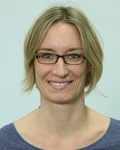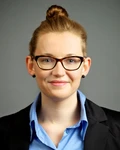Are you planning to pursue a bachelor’s or master’s degree in electrical and computer engineering, informatics or mathematics in Germany? The TUM School of Computation, Information and Technology (CIT) at the Technical University of Munich (TUM) might be the perfect fit for you. Our degree programs provide exceptional training in various fields and effectively prepare you for your chosen career path. With our diverse international student body, we are well-equipped to support you with any questions or concerns. We look forward to meeting you!

For the degree programs in Mathematics and Electrical and Computer Engineering: Julia Cyllok

For the degree programs in Informatics: Lena Krone
At the TUM School of CIT, we offer a wide range of bachelor’s and master’s programs in the fields of Electrical Engineering and Information Technology, Data Science and Artificial Intelligence, Informatics, and Mathematics: Available Degree Programs
Are you considering writing your doctoral thesis at CIT? You will find information on the doctorate here.
You will need to prove that you have sufficient language skills when you submit your application. Please check the web pages for your preferred degree program to see what language skills are required. You will find information on the accepted language certificates on the central TUM pages.
To be admitted to a degree program at TUM, you need to apply online before the application deadline. You will find step-by-step instructions on the central TUM website. Pay special attention to the information for international applicants.
Application deadlines and required application documents vary between degree programs. Pay attention to the specific application information on the respective degree program web pages of the TUM School of CIT.
We recommend that you apply as early as possible. Upload your application documents to the TUM application portal at the start of the application period if possible. The earlier we receive your application, the faster you will receive a reply and can apply for a visa in good time (if required).
A variety of resources and events are available for first-year students to help as you start your studies. Some offers are online, and many are on-campus. Depending on the semester when you are starting, we recommend arriving at the beginning of October (beware of the busy times of the Oktoberfest) or at the beginning of April.
- Orientation program for Electrical and Computer Engineering degree programs
- Orientation program for Informatics degree programs: Bachelor’s; Master’s
- Orientation program for Mathematics degree programs
Before you start at TUM, you should gain an overview of the next steps to take: Organizational matters before starting studies
Set deadlines need to be observed for enrollment, and a number of official documents need to be uploaded to TUMonline.
All students in Germany are required to have health insurance. You have to prove that you have student health insurance when enrolling. Confirmation of a foreign health insurance policy is not sufficient.
After enrollment, all TUM students receive a Student Card that they use as their student ID. This is a multifunction chip card that you can use to make cash-free payments, for example, for meals in the student canteen.
You can purchase a discounted Semester Ticket or Deutschlandticket subscription for students to travel on public transport.
International students who do not come from the European Union or some selected countries require a student visa before entering Germany. It may take several weeks or months for your visa to be issued. Therefore, inquire as soon as possible at the German embassy or consulate in your home country about the formalities.
In addition, you are obliged to apply for a residence permit when you start studying at a university in Germany.
As a rule, you will have to present proof of financing to obtain the visa and later to extend your residence permit. You can prove you have finances for your living costs in several ways.
You can obtain further information from the Citizenship and Immigration Services in Munich (KVR, Ausländerbehörde München): Residence permit for studies; Step-by-step residence permit from KVR
International students from the European Union, the European Economic Area (EEA), and Switzerland do not require a visa nor a residence permit (EU freedom of movement). They do, however, have to register their address in Germany like everyone else. If this applies to you, you will need to register with the local authority where you reside in Germany.
TUM charges tuition fees for students from non-EU/EEA countries. You will find information on scholarships and possible waivers on the central TUM website. The Munich Student Union (Studierendenwerk) can also provide further information about financing your studies.
Munich is one of Germany’s most popular and economically attractive cities. It has been attracting from home and abroad for many years. As a result, housing space in the city has become increasingly scarce and more expensive, so finding accommodation can be a difficult and long process. It is almost impossible to find low-cost student rooms, particularly in the winter semester.
Public-Owned Student Dorm or Private Accommodation?
Unlike in other countries, German universities do not run student dorms. TUM also does not organize accommodation for students. It does, however, support them with information, tips, and addresses for finding accommodation in Munich and its surrounding area.
Most student dorms are managed by the Munich Student Union (Studierendenwerk). All international degree-seeking students can apply for a dorm room through the Student Union immediately after admission. The waiting time is between one and four semesters due to limited availability.
In addition, Munich has a large number of private or church-run student dorms. Rooms in private dorms are considerably more expensive but often easy to organize from abroad. In the case of church-run accommodation, involvement in social projects or your religious affiliation frequently plays a role in the assignment of rooms.
Most Munich students share private apartments or sublet. Renting an apartment can often be very expensive depending on the location.
Tips for Finding Accommodation in Munich and its Surrounding Area
Demand for accommodation in Munich is very high and it is difficult to find an inexpensive room. Be prepared to spend several weeks or months looking for accommodation in Munich and its surrounding area. You will find information on which
districts are particularly expensive or cheaper and how to read accommodation adverts correctly in the TUM tips for finding accommodation. Also note the following tips:
1. Plan plenty of time
Apply to the Studierendenwerk and to private dorms for a room at the same time as soon as you have received your admission. Don’t look just in Munich for apartments or rooms, but also in Garching, Neufahrn, Eching, Oberschleißheim, and Unterschleißheim.
2. Search actively
Use all channels: websites, Facebook groups, word-of-mouth advertising, noticeboards in the university refectories, newspaper ads, etc. Post your own well-worded wanted ads.
3. Call immediately
Respond to suitable offers immediately. The faster you contact landladies or landlords, the greater your chance of success. Do not hesitate to make phone calls, emails are often not answered. Speaking German will make accommodation hunting much easier on the private market.
4. Make a good impression
Take your curriculum vitae and proof of income or bank statement along with you when viewing an apartment. If possible, present a letter of recommendation.
5. Beware of fraud
There are many fraudulent accommodation adverts. Do not transfer any money for deposits or rent from abroad before seeing the accommodation and signing the rental agreement. Do not send copies of your ID in advance via email – your identity could be stolen.

International students face enormous challenges in the first weeks of their stay: a foreign country, a new university, and no social contacts yet. To make starting studies easier, we assign experienced TUM students as mentors who are there to provide help and advice to our international students. Each subject area has its own program and supports its own students.
Even though you can take a large number of master’s programs in English, you should learn German during your studies in Munich at the latest. Good German language skills will simplify everyday life and are particularly important if you want to work in Germany.
Free German Courses at the TUM Language Center
If you get the opportunity to take a German language course before arriving here, make use of it. Here in Munich, the TUM Language Center offers German courses free of charge for various levels. However, due to the high demand, a place in the course is not always guaranteed.
Are you writing a term paper or presentation, a bachelor's or master's thesis, and have questions about structure, form, or conventions of academic writing in German? TUM's writing assistance can help you optimize your current text and develop your writing skills in the long term. This service is available to all international students at TUM. Appointments can be made online.
For Master's Students at CIT: German Matters Program
The German Matters Program is aimed at international master's students at our school who want to improve their basic German skills as swiftly as possible and confidently to a sound level. Over three semesters, you can put together your individual German learning program from a range of language courses and interesting additional offers – with a guarantee of a place on the course of your choice. It is best to register before the semester begins. Participation is even free of charge.
Tailored for Bachelor's Students in Informatics, Information Systems and Games Engineering: Subject-Specific German Course
Even if you already have good German language skills, our experience shows that subject-specific language can be tricky in informatics. The subject-specific German course for students in informatics degree programs should help you understand, discuss, and present specialist texts (including written exams) better. International students in bachelor’s or master’s informatics degree programs can take part in the course.
Winter semester 2025/26 – the course takes place in person on the Garching campus:
Deutsch im Bachelorstudium – Informatik: Wissenschaftliche Texte verstehen und schreiben (SZ0324)
Level: C1 (minimum DSH 2 or TestDaF 4)
Instructor: Barbara Bauer-Hutz
Winter semester 2025/26: Wednesdays, 12:00 to 1:30 p.m.
Room: 00.08.059
ECTS: 3 credits in the area of support electives
Registration: via TUMonline (possible from October 1, 2025)
The course “Deutsch im Studium C1 – Informatik: Schreiben, präsentieren und diskutieren im Fach (SZ0328)” is offered in the summer semester.
3 ECTS as support electives can only be credited if you are a foreign student (no degree from a German school or German-language program). Only one of the two courses (SZ0324 or SZ0328) can be credited. Apart from that, a certificate of participation with or without a grade can be issued. In addition, the course can be credited as part of the certificate program “German for Engineers”.
If you have any questions about recognition as a support elective, please contact the secretary of your degree program (to be found under contact for the respective degree program).
Tailored for Electrical Engineering and Information Technology Master's Students: Subject-Specific German Course
A special subject-specific German course is offered to Electrical Engineering and Information Technology master's students (module number SZ0325) every semester at the TUM Language Center. Furthermore, the center offers a certificate program “German for Engineering Students". International students can have German courses in the area of additional teaching subjects recognized in their degree program.
The degree programs at the TUM School of CIT involve demanding disciplines. Are you facing a challenge in your degree program? If so, contact the Student Advising at CIT as soon as possible. Staff there will gladly help you find a solution to your problem.
Also at the central level, there are support offers that you can make use of when you need help. You will find contact persons, organizations, and an FAQ page there.
The Student Union offers free advice on a wide range of topics (including financing, legal matters, social issues, and psychological counseling): Advice and Counseling Network
Advice schemes for entrepreneurs and start-ups at TUM: Center for Innovation and Business Creation at TUM (UnternehmerTUM)
International students are allowed to work alongside their studies as a means to finance part of their living costs. However, a few restrictions do apply. Therefore, it is important to know the Work Regulations for International Students.
TUM supports students, PhD candidates, and alumni in planning their careers. No matter whether you are looking for a job, starting a career, or advancing your career, the TUM Career Service offers a wide range of schemes: from topic-based webinars and workshops through one-to-one coaching and podcasts to its own Job Portal.
If you are specifically looking for a student side job, check out the TUM Job Portal. You will find student jobs and internships at TUM and in industry there. If you don’t manage to find anything in the portal, here are further job boards.
The tax laws in Germany are complicated and hard to understand even for Germans. The information portal TaxSense provides a good overview of the topic of taxes and contributions.
TUM has a large number of Student Clubs that are always looking for new members.
The TalkTUMi Language Café is held every Wednesday during the semester both on the Garching campus and on the Munich campus. You can chat in different languages in a relaxed atmosphere over coffee, tea, and cake, and get to know students from all over the world.
On our International Day, we celebrate the internationality and diversity of the TUM School of CIT together with our students.




